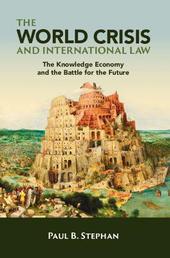
|
The World Crisis and International Law: The Knowledge Economy and the Battle for the Future
Paperback / softback
Main Details
| Title |
The World Crisis and International Law: The Knowledge Economy and the Battle for the Future
|
| Authors and Contributors |
By (author) Paul B. Stephan
|
| Physical Properties |
| Format:Paperback / softback | | Pages:296 |
|
| ISBN/Barcode |
9781009320993
|
| Classifications | Dewey:341 |
|---|
| Audience | |
|---|
| Illustrations |
Worked examples or Exercises
|
|
Publishing Details |
| Publisher |
Cambridge University Press
|
| Imprint |
Cambridge University Press
|
| Publication Date |
9 February 2023 |
| Publication Country |
United Kingdom
|
Description
The knowledge economy, a seeming wonder for the world, has caused unintended harms that threaten peace and prosperity and undo international cooperation and the international rule of law. The world faces threats of war, pandemics, growing domestic political discord, climate change, disruption of international trade and investment, immigration, and the pollution of cyberspace, just as international law increasingly falls short as a tool for managing these challenges. Prosperity dependent on meritocracy, open borders, international economic freedom, and a wide-open Internet has met its limits, with international law one of the first casualties. Any effective response to these threats must reflect the pathway by which these perils arrive. Part of the answer to these challenges, Paul B. Stephan argues, must include a re-conception of international law as arising out of pragmatic and limited experiments by states, rather than as grand projects to remake and redeem the world.
Author Biography
Paul B. Stephan, the John C. Jeffries, Jr., Distinguished Professor of Law at the University of Virginia, has taught and written about international law and the world economy. He has taught and published in China, Russia, Europe, Australia, and Israel. He has also served in the US Departments of the Treasury, State, and Defense, and advised the IMF, the World Bank, and the OECD.
Reviews'At a time when we try to understand the crises the world is facing, this book digs deep and solves a big part of a puzzle. Knowledge is generally seen as good, but the knowledge economy as the input to globalization may produce undesired consequences. The book does not throw out the baby with the bath water but attempts to save liberal internationalism from itself with concrete proposals for international law and governance. A must-read for anybody seeking solutions to our current crises.' Anne van Aaken, University of Hamburg 'A brilliant account of the economic, social, and political factors contributing to the unraveling of international law and institutions since the heyday of 'liberal internationalism.' Stephan persuasively shows how the accelerating pace of technological change induced by the knowledge economy explains this unraveling, and how nations can spark new forms of international cooperation to respond to global challenges. This book is a must-read for understanding where international law is today.' Jack Goldsmith, Harvard Law School 'We hear a lot today about threats to the liberal world order. In this timely book, a leading American scholar of international law offers an incisive and original account of that order-including how it developed, what sustained it, and why it is unraveling. Drawing together a wide range of examples, Stephan lays out what it will take to restore the international consensus needed to confront global challenges of the future.' Matthew Waxman , Columbia Law School
|